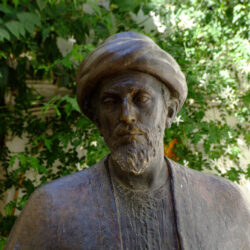
Mosheh ben Maimon (משה בן מימון), called Moses Maimonides (/maɪˈmɒnɪdiːz/ my-mon-i-deez) and also known as Mūsā ibn Maymūn (Arabic: موسى بن ميمون), or RaMBaM (רמב"ם – Hebrew acronym for "Rabbeinu Mosheh Ben Maimon" – English translation: "Our Rabbi/Teacher Moses Son [of] Maimon"), was a preeminent medieval Spanish, Sephardic Jewish philosopher, astronomer and one of the most prolific and influential Torah scholars and physicians of the Middle Ages. He was born in Córdoba (present-day Spain), Almoravid Empire on Passover Eve, 1138, and died in Egypt on December 12, 1204.
Although his writings on Jewish law and ethics were met with acclaim and gratitude from most Jews, even as far off as Iraq and Yemen, and he rose to be the revered head of the Jewish community in Egypt, there were also vociferous critics of some of his writings, particularly in Spain. Nevertheless, he was posthumously acknowledged to be one of the foremost rabbinical arbiters and philosophers in Jewish history, his copious work comprising a cornerstone of Jewish scholarship. His fourteen-volume Mishneh Torah still carries significant canonical authority as a codification of Talmudic law. In the Yeshiva world he is called sometimes "haNesher haGadol" (the great eagle) in recognition of his outstanding status as a bona fide exponent of the Oral Torah.
(from "Maimonides" on wikipedia)
Filter resources by Category
Filter resources by Tag
Filter resources by Collaborator Name
Filter resources by Language
Filter resources by Date Range
Contributed by:
Aharon N. Varady (transcription), Aharon N. Varady (translation), Moshe ben Maimon
This prayer for divine contemplatives, beginning with the incipit “Tefilat Lisgulat Ishim” (prayer for distinguished individuals), is attested in several manuscripts prefaced by the title, תפלת הרב רבינו משה זצ״ל (prayer of our teacher, Rabbi Mosheh, may their righteousness be remembered for a blessing). The Rabbi Mosheh here refers to Rabbi Mosheh ben Maimon — Maimonides (1138-1204). Transcribed from the manuscript Leiden Or. 4779, this is the first time this obscure and long overlooked prayer attributed to Maimonides has been translated. . . .

